No Results Found
The page you requested could not be found. Try refining your search, or use the navigation above to locate the post.
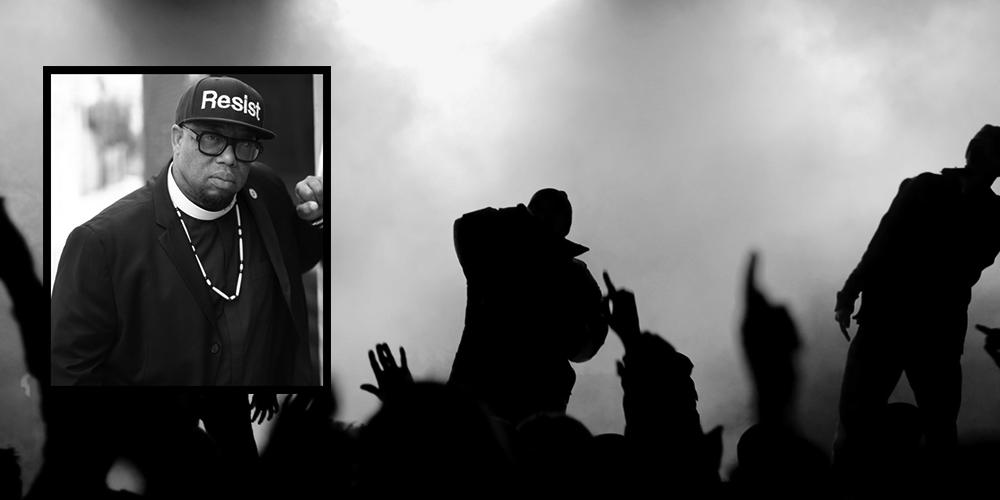
Video Courtesy of Hip Hop Caucus
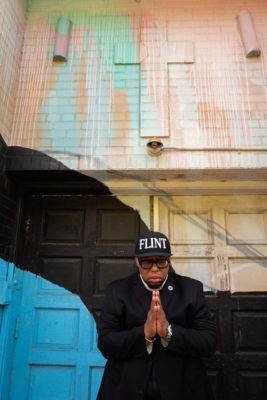 “As Americans, we face challenges head-on. Climate change is not a Democrat issue or a Republican Issue. It is a human issue. This crisis is complex. It impacts all of us and future generations. And those with the least resources are impacted first and worst,” testified Rev. Lennox Yearwood Jr., president and CEO of the Hip Hop Caucus, before the House Committee on Natural Resources a few weeks ago. “If this committee and both chambers don’t urgently come together, put the people of this country first, put God first and put your political party to the side to solve climate change, we don’t make it beyond 12 years from now without huge amounts of death, destruction, and suffering.”
“As Americans, we face challenges head-on. Climate change is not a Democrat issue or a Republican Issue. It is a human issue. This crisis is complex. It impacts all of us and future generations. And those with the least resources are impacted first and worst,” testified Rev. Lennox Yearwood Jr., president and CEO of the Hip Hop Caucus, before the House Committee on Natural Resources a few weeks ago. “If this committee and both chambers don’t urgently come together, put the people of this country first, put God first and put your political party to the side to solve climate change, we don’t make it beyond 12 years from now without huge amounts of death, destruction, and suffering.”
For more than a decade, Rev. Yearwood and his celebrity-infused, non-partisan Hip Hop Caucus have been hyper-focused on voter turnout, but also tackling big issues, such as climate change and environmental justice, civil and human rights, voting rights and election system reforms, and economic empowerment. The Hip Hop Caucus is the result of four voter drive organizations merging back in 2004: Russell Simmons’ Hip Hop Summit Action Network, P. Diddy’s Citizen Change (“Vote Or Die!”), Jay Z’s “Voice Your Choice,” and AFL-CIO’s “Hip Hop Voices.” It was the force behind the 2008 “Respect My Vote!” campaign, which touted registering the most voters in one day: 32,000 people across 16 U.S. cities.
With the 2020 presidential campaign season kicking in, Urban Faith reached out to Rev. Yearwood to chat about social justice, Christianity, his spiritual journey to fighting for underserved communities, and what’s up next for the Hip Hop Caucus.
Some Christian leaders believe that social justice is not “Christian.” How do you respond to that?
I think there’s nothing more Christian than having social justice. I can’t understand how folks can say they’re Christian and not, to me, see how many times Christ literally fought — fought for the woman by the well, fought for those who were out in the desert who were hungry, fought for those who were infirmed, fought for those who were hurting because there was no fish in the net. I mean, there’s story upon story upon story upon story, even to the very end with the thief on the cross.
I can’t understand how you could not connect social justice and overcoming when people have been wronged, with Christ. So that baffles me a little bit. To me, if your faith is not connected to justice, it doesn’t have the kind of power that it could have with a faith based upon justice and freedom.
You received your bachelor’s degree from the University of the District of Columbia and your Master of Divinity from Howard University. What led you to do what you do? What was your spiritual journey?
I grew up around the church, so the Christian faith was not something that was unusual. I have many ministers in my family. My uncle was a Church of God in Christ bishop. My aunt has her own church. I grew up around a number of faith-driven people who were Christians. My background was one in which I came from a very spiritual background.
I was the student government association president at the University of District Columbia. It wasn’t so much that I was in a situation that I had something that went wrong, so to speak, and was called into ministry. But I believe very strongly in helping people, and I could feel a definite call when I was finishing up my last term. I was also SGA president when I was at divinity school too, but in my second term I began going to homeless ministries here in Washington, DC, and was also very dedicated to working with young people, and a more of social justice type of ministry.
When I went to seminary, my first calling was to go and teach. I was extremely good at the Old Testament and became the first person at Howard Divinity to be a teaching assistant for both the Old Testament and the New Testament because I could speak Greek and Hebrew. I was going to go up and get my Ph.D. in Old Testament studies, which was normal because my parents both had Ph.D.s. My mom has her Ph.D. in psychology, and my dad a Ph.D. in African and social studies — he was a dean at Howard. So it wasn’t a long stretch for me to go that way at all, and to teach.
But it was also a retreat because I was at the time very frustrated with the church. There was a lot of emphasis around prosperity ministry, and that wasn’t for me. I think the calling came when the war was going to break out and we were getting ready to invade Iraq. I was a chaplain, and I began to speak out against the war while I was in the Air Force — I was in the Reserves on the weekends. It wasn’t the best career move.
I got a call from Dr. Ben Chavis, who was working with Russell Simmons, and he says, “Would you like to work with organizing young people?” So, at the time I’m going through a situation with the Air Force. I said, “Well, why not?” Might as well. You know, I didn’t know my journey. I may be thrown in prison. I don’t know what’s going to happen to me because of me speaking out.
It all sounds heroic, but at the time it was very much a situation with my lifestyle of being a middle class, African-American with two very small children. I literally put it on the line for what I believe and trust in God that I was doing the right thing. What I began to see is that I had to give up all of my privilege. My privilege of growing up with parents who had Ph.D.s. My privilege of growing up middle class. My privilege of going to good schools. My privilege of being an SGA president or being on a basketball team. All those things that I would use as privilege had to be stripped away, and I realize that now. They had to be stripped away before I could do effective ministry, so I could be at the bottom. Then, once you get to the bottom and you feel vulnerable, you can connect. Not in charity, but in solidarity with those who have been oppressed. Your whole mission can change and that’s probably where I am now.
I am in a position where I can connect with young people, folks who are from really tough situations, because I’ve been stripped down and can connect with them through faith and Christ.
What are your plans for the 2020 Presidential election? Is the Hip Hop Caucus doing a bus tour again?
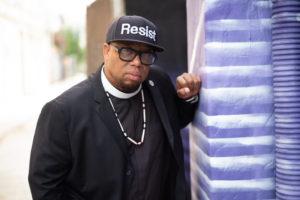 Yeah, yeah. We’re going to get out the vote. Just last year, our “Respect My Vote” campaign celebrated ten years, which is exciting. It was an award-winning campaign. We’re going to continue that. We take a lot of pride in being nonpartisan. When the “Respect My Vote campaign” was created in 2008, I mean, clearly there was a tremendous amount of excitement around Barack Obama, and for a good reason. Nothing wrong with that. But we felt that it was important that young people kept their lane in that. We got a lot of heat back then for not supporting any candidate, and if you were going to support one, that probably would have been the one to support. But we didn’t. We were like no, we want to make sure that we can also hold that person, he or she, accountable, and that’s what we did, and that’s important to us.
Yeah, yeah. We’re going to get out the vote. Just last year, our “Respect My Vote” campaign celebrated ten years, which is exciting. It was an award-winning campaign. We’re going to continue that. We take a lot of pride in being nonpartisan. When the “Respect My Vote campaign” was created in 2008, I mean, clearly there was a tremendous amount of excitement around Barack Obama, and for a good reason. Nothing wrong with that. But we felt that it was important that young people kept their lane in that. We got a lot of heat back then for not supporting any candidate, and if you were going to support one, that probably would have been the one to support. But we didn’t. We were like no, we want to make sure that we can also hold that person, he or she, accountable, and that’s what we did, and that’s important to us.
We want to make sure that whoever is in office, Democratic or Republican or Independent, we’re able to hold you accountable and measurable. Millennials and Gen Z drive us — I mean, we let their issues regarding the economy and climate change and civil rights be at the forefront. Right now, we’re very concerned about what’s going on with the voter suppression and what we saw in North Carolina, Georgia, and Florida. We have issues that affect everybody. It doesn’t matter if you’re Republican or Democratic if you want clean air. I think we all want clean air and we want clean water.
We also challenge ourselves as an organization. We know that in general, our movement and sometimes the culture can be very patriarchal, very male-driven, and so we are actually board-mandated that anything that we do has to have gender balance, or even more so, we have to put forth women in our movement, because it’s such an important thing in that process. We’ve been very blessed doing that for the past 10 years.
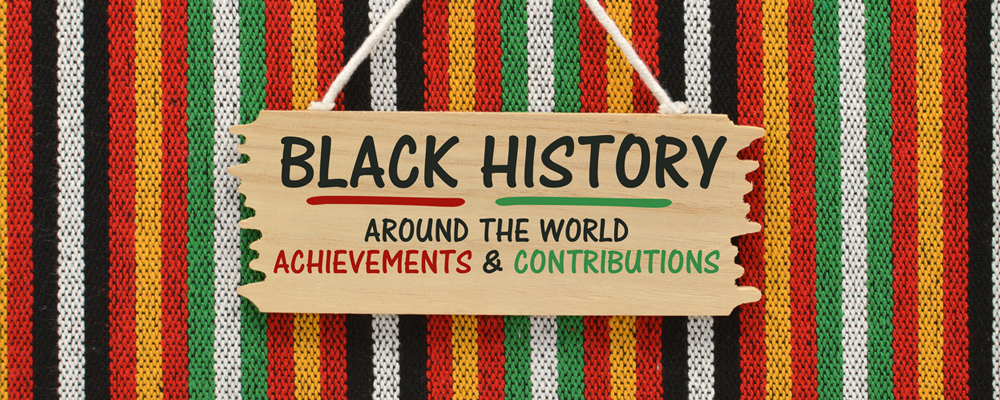
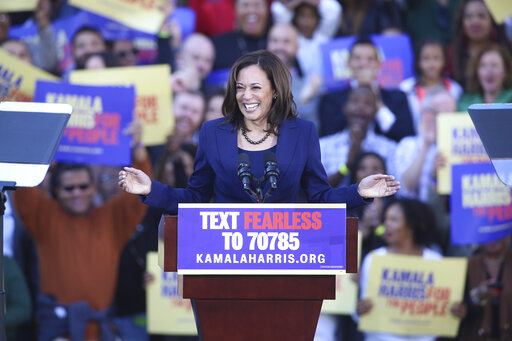
Video Courtesy of TIME
Democratic Sen. Kamala Harris, standing outside of Oakland’s city hall, formally kicked off her campaign for the White House on Sunday, presenting herself as the leader who can best unite an America that is at an “inflection point” and facing a critical question.
“We are here because the American Dream and our American democracy are under attack and on the line like never before,” Harris said. “And we are here at this moment in time because we must answer a fundamental question: Who are we? Who are we as Americans? So, let’s answer that question to the world and each other right here and right now. America, we are better than this.”
Harris, a first-term U.S. senator from California who announced her candidacy last Monday, rallied thousands of supporters at the Frank Ogawa Plaza in Oakland, her hometown and where she served as a prosecutor before becoming the state attorney general.
Harris invoked the speech that Robert F. Kennedy gave in 1968 when he announced that he would challenge President Lyndon B. Johnson, noting that Kennedy said “at stake is not simply the leadership of our party and even our country, it is our right to moral leadership of this planet.”
Harris added, “So today I say to you, my friends: These are not ordinary times, and this will not be an ordinary election, but this is our America.”
Harris’ campaign is filled with historic possibility. If she ultimately wins the White House she would be the first African-American woman and first person of Asian descent to be president.
Harris, the daughter of immigrants from Jamaica and India, said that as she and her sister, Maya Harris, grew up in the East Bay they were “raised by a community with a deep belief in the promise of our country, and a deep understanding of the parts of that promise that still remain unfulfilled.”
She has attributed her decision to become a lawyer and a prosecutor to her upbringing, and said Sunday that she and her sister were “raised to believe that public service is a noble cause and the fight for justice is everyone’s responsibility.”
She said she is running “with faith in God, with fidelity to country, and with the fighting spirit I got from my mother.”
Harris’s launch has drawn heavily on symbolism. She officially entered the race on Martin Luther King Jr. Day. Campaign aides say she has drawn inspiration from Shirley Chisholm, a New York congresswoman who in 1972 became the first black woman to run for president from a major party.
Harris’ first news conference as a candidate was on the campus of Howard University, the historically black college in the nation’s capital that she attended as an undergraduate. On Friday, she was in South Carolina to speak to members of the Alpha Kappa Alpha sorority, of which she is a member. Other members of the group, wearing traditional pink and green, were on hand at Sunday’s rally.
Her choice of Oakland for her campaign launch was both biographical and symbolic. The state of California has played a leading role in resistance to the presidency of Donald Trump. And Oakland itself, where she was born and spent her formative years, has a history of activism. The plaza outside City Hall where Harris spoke once housed Occupy Oakland’s encampment. When Barack Obama ran for president in 2008, he picked the site for his first Bay Area campaign event.
Michael Ahrens, a spokesman for the Republican National Committee, called it “fitting” that Harris chose “the most liberal district in deep-blue California to launch her campaign.”
Harris’ campaign is expected to highlight her career as a prosecutor as part of her rationale for seeking the presidency. Harris was the first black woman elected district attorney in California, as well as the first woman, first African-American and first Asian-American to hold that job.
On Sunday, she said she has long known the criminal justice system to be “deeply flawed” but that she also knew the “profound impact law enforcement has on people’s lives and its responsibility to give them safety and dignity.”
Harris said throughout her life she has “only had one client: the people,” echoing the words she has used in courtrooms and has adopted as her campaign’s slogan.
Harris also did not shy away from taking on Trump directly, saying the U.S. welcomes refugees and calling the wall that Trump wants to build at the southern border a “medieval vanity project” that would not actually stop transnational gangs, which she noted she battled as state attorney general. She also said that, as president, she would “always speak with decency and moral clarity and treat all people with dignity and respect. I will lead with integrity. And I will tell the truth.”
Harris is among the first major Democrats to jump into what is expected to be a crowded 2020 presidential contest.
Sens. Elizabeth Warren of Massachusetts and Kirsten Gillibrand of New York have announced exploratory committees. Former Maryland Rep. John Delaney and Julian Castro, federal housing chief under President Barack Obama and a former San Antonio mayor, already are in the race.
Sens. Cory Booker of New Jersey, Sherrod Brown of Ohio, Amy Klobuchar of Minnesota and Bernie Sanders of Vermont may also run.
After the rally, Harris planned to her first trip to Iowa as a presidential candidate. In the weeks before last November’s elections, she traveled to the leadoff caucus state to campaign on behalf of Democrats, and also visited other early-voting states.
Harris’s campaign will be based in Baltimore and led by Juan Rodriguez, who managed her 2016 Senate campaign. Aides say the campaign will have a second office in Oakland.
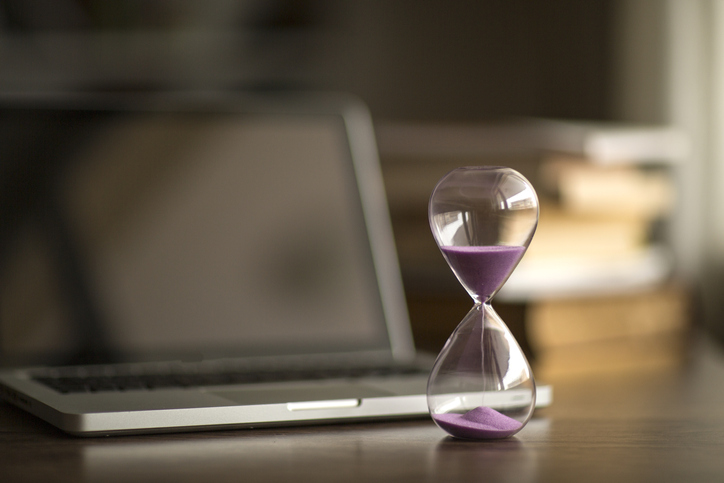
I’ve read about moms who have known since their kids were toddlers that they wanted to homeschool. That wasn’t the case for my family. Until recently, both my two boys have always been in public schools. Our journey to homeschooling came by way of a lot of personal issues that we couldn’t have predicted. Honestly, I never considered it before now. But here I am and, actually, I’m starting to wonder why I waited so long. I wanted to do this column to provide resources and encouragement to others who find themselves in a similar situation. I’ll be writing a new post each month (or more if time permits) with an update on how we’re doing, adding any new resources I’ve uncovered, and sharing tidbits about homeschooling that I’m learning along the way.
— Shari
The page you requested could not be found. Try refining your search, or use the navigation above to locate the post.

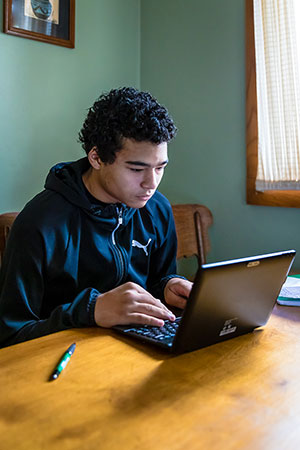 Special Package: An Unlikely Journey to Homeschooling
Special Package: An Unlikely Journey to Homeschooling
After playing for years on a very competitive baseball team, my son lost interest, complaining that his stomach hurt. He went from a kid who loved the game, to one who was repelled by it. The pain came and went sporadically. Then two years later at the start of 7th grade, it got worse. The trigger seemed to be increasing demands at school, from big presentations to stressful unit tests to just a lot of unfinished homework piling up.
Every morning was torture. I’d go to wake him up for school and I didn’t know whether he would fight his way awake or just pull the covers over his head and curl into a ball. I couldn’t understand why it was so impossible for him to fight through the pain. He would look at me with watery eyes and say he just couldn’t move.
My husband and I wanted to make sure he didn’t have some kind of underlying medical issue, so I took him to all sorts of specialists who examined him thoroughly with X-rays and blood tests. He was missing weeks of school at a time, but the tests revealed he didn’t have any physical ailments.
Finally, we broke down and had a full neurological exam, which cost us $1200—even with our health insurance. After the doctors reviewed surveys from us and his teachers, we finally got a diagnosis. Our son suffered from depression and anxiety disorder. Since both my husband and I have family members dealing with mental health issues, it wasn’t that out of the realm of possibility, I just hadn’t realized that this was how it could manifest itself.
Seeking Help & Support
We decided to enroll him into a Christian school anxiety and refusal program at a children’s hospital near our home so he could keep up his studies while getting therapy.
When we pulled up to the hospital for the first time, I saw a gigantic statue of Jesus with open arms — you know, like the Christ the Redeemer statue in Brazil. I felt like I was in the right place. After a few months of therapy, it seemed like we were making progress. However, he didn’t seem particularly eager to go back to his regular school.
In fact, this is when the idea of homeschooling first came up. My cousin homeschooled her kids in their elementary years and her oldest, who was accepted into one of the most competitive high schools in the Chicago area, had just been accepted to Stanford University. When my son asked to be homeschooled, too, I shot him down pretty quickly. That wasn’t even something I felt I could consider. Sure, I’ve been to college and I have a master’s degree, but in no way did I consider myself a teacher. People go to school for years to learn how to teach kids, I reasoned. I felt like I’d be short-changing his education.
Feeling alone and frustrated, I started talking to parents in my church about our challenges. It turns out that two moms I talked to regularly also had kids suffering from anxiety and depression. Both had put their kids in similar school refusal/anxiety programs. In fact, one had a son who was pretty close to my kid. They often attended youth activities together at church, but the mom never shared what she was going through until I opened up about our family’s struggles. The other mom served as the youth director for the church. I still appreciate our heart-to-heart conversations. I also began reaching out to church leaders for support and they gave us the gift of love, checking on us regularly and adding us to the prayer circle. The senior pastor even took an interest in strategizing on ways the church could support my son to help get him back on track. No one judged us. I so appreciated that.
By the end of 7th grade, we had gotten him back going to his regular public school, sort of. He still was missing a few days every week or so, but nothing like the year before where he missed nearly thirty days of school in one semester. I thought we were moving past a difficult phase. I was wrong. Eighth grade was almost as bad as seventh. He barely graduated and he wasn’t looking forward to high school.
Starting Public High School
Two months into his freshman year, the stomach ache absences started again. At this point, he was on medication to deal with his disorder and to keep the pains at bay. He was missing school every single week.
Ironically, I had started writing a story on how more Black parents were homeschooling, which had me interviewing friends, parents and other experts. My son saw me working on the article and raised the question again about homeschooling. After talking to people who were doing it with kids the same as age as my son, I started to think maybe it wasn’t so far-fetched. I was really surprised at the support and encouragement I received from people I didn’t even know. I learned that homeschooling is different for everyone. There is no right or wrong way as long as your child is learning and thriving. Still, we weren’t ready to completely cut the cord with our public high school.
The counselors suggested a schedule where he came to campus for two classes and then took four classes at home through our district’s online schooling program. Our son also would need to have an individualized education plan, but the testing to receive this plan could take three months to schedule. Also, with the program, he still would have to come to school for tests. Given tests are a trigger for him, that wasn’t going to work for us. This plan started out okay, but even with only two classes on campus, the absences due to illness slowly returned.
However, he was doing very well with the online program so a month into the plan, we took the leap of faith and enrolled him full-time into the online high school. The school social worker didn’t think this was the right decision because she felt like we were “giving in” to his mental health issues. His counselor said that most kids he knew who went this route weren’t successful. But we did it anyway.
We also were worried about our son’s learning environment. Our community still is reeling from being featured in America to Me, a docuseries that brought to light some of the grumblings I’ve heard from African American parents over the years who were concerned about their boys and the learning vibe in our school system for people of color. I wondered if, without preconceived notions about what he could achieve, homeschooling could help to build up his confidence and reduce his anxiety.
We didn’t pull him without a plan. I knew what our state required for homeschoolers so I wrote a letter to the high school with details of our plan to educate our son. The day after we withdrew him from the high school, we received a letter in the mail from the attendance office telling us he had missed too many days to get credit for his courses. That confirmed we made the right decision.
Starting Homeschooling
We enrolled him in a regionally accredited online private school called Acellus Academy, which is run by the International Academy of Science. Four months in, things are so much better. He has virtual teachers in videos and a regular curriculum, but I am still very involved in the process, monitoring how he’s doing and stepping in when needed. Even as I am pleased with the program so far, I do feel the need to supplement with additional lessons from Khan Academy, Teaching Textbooks, and YouTube. (There are A LOT of very good teachers explaining just about everything on YouTube.). I’ve also learned a lot from private parenting groups on Facebook. Additionally, I’m going to incorporate Black history, field trips, and some faith-based teachings. I was looking for an all-in-one solution that I could build on, but every family is different and there are so many ways to structure a homeschooling environment. Some states even offer free programs through the local public school districts.
As for my son, the stomach aches have stopped altogether. He is very good about doing his work and currently has six classes and a 3.8 GPA. It only takes him about three hours to do his work, which I’m learning is fairly typical for homeschoolers. When you strip out lunch, gym, study hall, questions from other kids in the classroom, and other activities unrelated to learning, you can gain a lot more time to do other types of learning. When he turns 16, he may even get a job during the school year.
Homeschooling Blog on UrbanFaith.com
By sharing my story, I hope other parents will feel encouraged to consider homeschooling. Whether you’re dealing with a child with medical or mental health issues, or you just want a unique and positive educational experience for your kids, it can be a satisfying decision to take control of your student’s academic success. I plan to write about the good and the bad of our family’s journey on UrbanFaith.com, providing as many resources as possible for working with kids of all ages. My family is a little late to the game with a high schooler now learning at home. I’m not sure how our story is going to pan out in the end, but right now I have faith that we made the right decision.